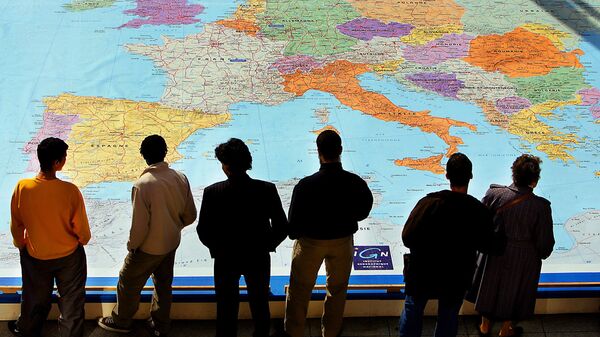Michel Barnier, Special Counselor for Defense Policy to Juncker said: "I think we have reached the moment of truth for the European project. Not only have we been conscious of Europe's destabilization, but of the risk of its disintegration."
Barnier said the two major crises to hit the European Union were the challenge from the influx of refugees, as well as the Eurozone crisis — epitomized by the Greece bailout issue.
EU's solution 2 refugee crisis remains slamming door on refugees needing protection, bribing Turkey 2 do dirty work. https://t.co/7ZRKinY1Ne
— Peter Bouckaert (@bouckap) December 1, 2015
#refugeecrisis = global dimensions. We need humanitarian initiatives, solidarity & EU values-not fences & closed borders @ERT3Social #Greece
— Alexis Tsipras (@tsipras_eu) November 27, 2015
The refugee crisis — in which hundreds of thousands of people have fled war zones, such as Syria, Iraq, Afghanistan, Libya, Somalia and Pakistan and made their way through into Europe — has plunged the European Union into crisis. German Chancellor Angela Markel declared her country's doors open to refugees, precipitating the biggest mass movement of people since the Second World War.
.@JunckerEU @Europarl_EN "If spirit of Schengen leaves us we lose more than #Schengen.We have to safeguard Schengen" pic.twitter.com/ZsG5bQ6LvW
— Mina Andreeva (@Mina_Andreeva) November 25, 2015
It immediately forced countries such as Germany itself, Austria, Croatia and Hungary to erect border controls, in spite of the Schengen no borders agreement. There has followed a huge row over where to put the refugees, with many countries shunning a quota system proposed by Merkel and Juncker. The whole principle of the freedom of movement of people — a central pillar of the EU — has been cast into doubt.
Community of vision between US & EU stronger than ever. As @JunckerEU says, it's time for us to shape up in defence https://t.co/XQ6HJs1rYb
— Michel Barnier (@MichelBarnier) November 20, 2015
Meanwhile, the Greek bailout crisis — in which the International Monetary Fund, the European Central Bank and the Eurozone nations have had to throw billions of dollars to support the Greek state and its banks — has cast doubt on the viability of a single currency, based on a perplexing diversity of member states with conflicting fiscal policies and economic cycles.
"On the one hand the financial crisis, which has killed growth in a number of European countries, and from which we have not yet recovered, even if happily enough some countries are better off. On the other hand, the ecological crisis, which provokes problems in Africa and movements of refugee. And naturally the wars, in Syria, in Iraq, in Libya, which provoke migration movements we are unable to control or welcome. All this creates an internal situation in many European countries which can lead to a standoff," Barnier told EurActiv.
He warned of the rise of right-wing parties across Europe setting an anti-Brussels nationalist agenda. "And in many countries we see the rise of populist movements, all of which are anti-European, protectionist, opposed to the single market, which advocate the return to the nation or even to nationalism," he said.


